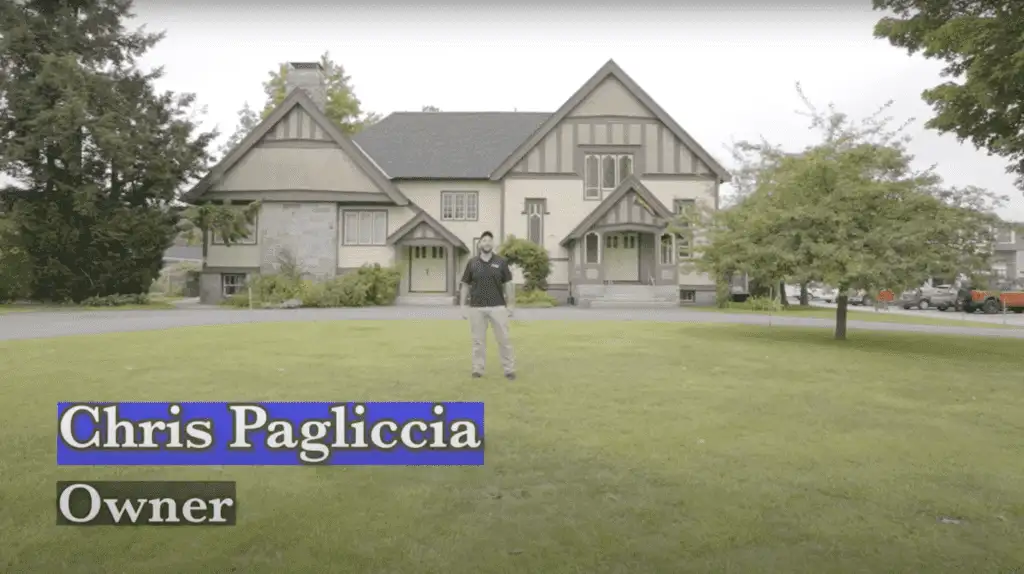Introduction: The Beauty and Burden of Old Homes
Here in New Hampshire, we’re surrounded by history. Many homes in towns like Exeter, Portsmouth, Dover, Kingston, Hampton, and Stratham date back 75, 100, or even over 150 years. These older homes often sit on fieldstone foundation walls — built with rocks collected from local fields and mortared together.
While fieldstone foundations have stood the test of time, they were never designed to withstand the modern pressures of moisture, frost heaves, and New England’s seasonal cycles. Over decades, the mortar binding those stones begins to crumble, and the walls themselves weaken.
At first glance, this might look like “normal aging” of an old home. But crumbling fieldstone walls are more than just a cosmetic problem — they’re a serious structural and safety concern that requires professional repair.
Signs of a Crumbling Fieldstone Foundation
Homeowners often don’t realize how serious their foundation issue is until it’s progressed. Look for these red flags in your basement:
- Mortar between stones turning to powder or sand.
- Stones loosening, shifting, or falling out of the wall.
- Bulging or bowing sections of wall.
- Damp, musty smells and visible moisture seeping through.
- Gaps or holes where daylight or cold air comes through.
- Sagging floors above the basement.
If you live in an older home in Plaistow, Seabrook, North Hampton, Amesbury (MA), or Haverhill (MA), these symptoms are especially common.
Why Crumbling Fieldstone Walls Are Dangerous
It’s easy to dismiss crumbling mortar or loose stones as “old house character,” but the risks are real and serious:
- Structural instability. As the mortar fails, stones shift out of place, reducing the wall’s ability to support your home.
- Moisture intrusion. Gaps in fieldstone walls let in water, leading to leaks, mold, and rot.
- Pest entry. Small gaps and cracks give rodents and insects easy access to your basement.
- Heat loss and energy inefficiency. Fieldstone walls already lack insulation; crumbling mortar makes it worse.
- Collapse risk. In extreme cases, sections of wall can give way, requiring emergency replacement.
Left unaddressed, what starts as a minor mortar issue can escalate into a full foundation failure — especially in New England’s wet springs and freezing winters.
Why DIY Repairs Don’t Work
Many homeowners try to “patch” crumbling fieldstone walls with store-bought mortar or cement. Unfortunately, this rarely solves the underlying problem and often makes it worse:
- New mortar may not bond properly to old stone.
- Applying the wrong mix can trap moisture, accelerating decay.
- Repointing without stabilizing the structure ignores the real issue.
- Improper work can destabilize the wall further, risking collapse.
Fieldstone repair is not like cosmetic brick repointing. It requires specialized knowledge of structural loads, moisture control, and soil pressure — things most DIY fixes can’t account for.
Professional Solutions for Crumbling Fieldstone Foundations
At 603 Basement Solutions, we specialize in stabilizing and repairing failing fieldstone foundation walls across New Hampshire. Depending on the severity of the damage, the solution may involve:
- Rebuilding or Reinforcing: Carefully dismantling compromised sections and rebuilding them with proper structural support.
- Wall Encapsulation: Creating a new, reinforced wall system inside or outside the existing foundation to provide long-term stability.
- Moisture Management: Installing drainage solutions to prevent water from worsening mortar decay.
- Complete Wall Replacement: In extreme cases, replacing sections or the entire foundation wall with modern reinforced concrete while protecting the home above.
Every project begins with a thorough inspection, ensuring that the repair addresses not just what you see, but the root causes beneath.
The New England Factor: Why Local Homes Are Vulnerable
New England soils, especially in towns like Exeter, Portsmouth, and Brentwood, retain water and expand during freezing winters. This repeated freeze-thaw cycle puts constant pressure on fieldstone walls, widening gaps and breaking down mortar.
Older homes built directly on soil, without modern footings, are even more at risk. What worked for a farmhouse in the 1800s doesn’t always hold up under today’s conditions — particularly with heavier homes, higher groundwater tables, and more extreme weather.
That’s why working with a contractor who understands historic New England foundations is essential. Repairs must respect the home’s age while delivering modern structural strength.
How 603 Basement Solutions Repairs Fieldstone Foundations
Our approach balances structural safety with respect for your home’s history:
- Inspection & Diagnosis: We evaluate the extent of mortar decay, wall movement, and water intrusion.
- Stabilization Plan: Engineering decisions are made on whether reinforcement, partial rebuilding, or replacement is required.
- Professional Installation: Using specialized tools and materials suited for fieldstone, we stabilize and strengthen the wall.
- Moisture Protection: We ensure water isn’t allowed to keep damaging the wall in future seasons.
- Permanent Peace of Mind: Our solutions are designed to preserve your home for decades to come.
We’ve successfully completed projects on historic homes in Portsmouth, Dover, Amesbury, and Salem, where homeowners wanted modern stability without sacrificing the charm of their original foundation.
When to Call a Professional
If you see crumbling mortar, loose stones, or bowing in your fieldstone foundation walls, don’t wait. The earlier you act, the more likely the repair can be contained before a costly full wall replacement is needed.
Remember: fieldstone foundations are not like modern concrete — they require specialized professional care to remain safe.
Conclusion
Crumbling fieldstone walls aren’t just a cosmetic nuisance; they’re a direct threat to your home’s stability.
At 603 Basement Solutions in East Kingston, NH, we’ve spent years restoring and reinforcing old New England foundations. We understand the unique challenges posed by frost heaves, seasonal soil movement, and century-old construction methods.
If your home in Exeter, Kingston, Portsmouth, Dover, Hampton, Stratham, Plaistow, or Haverhill (MA) shows signs of a failing fieldstone foundation, call us today. We’ll provide a professional inspection and a plan to restore your foundation safely and permanently.
📞 Contact 603 Basement Solutions now to protect your home’s foundation — and its history — with expert care.










